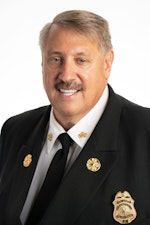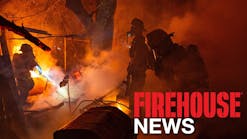Are you angry yet? I'm beginning to fume. It seems to be open season on the fire-EMS service. First, it is the ongoing firefighter job cuts throughout the United States. Next, a consulting firm comes out with a report saying that firefighting and cancer are not related. And the third blow is a foundation urging Congress to eliminate all funding to firefighter grant programs. I feel like the fire service has a huge target on its back.
I watch the headlines as local governments continue to cut firefighter jobs and service levels. And none of it is any firefighter's fault. Seems a bunch of federal lawmakers decided to let everyone share in the America dream of owning a home. They changed laws and encouraged a relaxing of loan practices for mortgage companies. Relaxed lending practices, low unemployment, an economy that was not doing badly and low interest rates led many people who had bad credit to buy houses that were out of their price range. The mortgage companies and banks, in cahoots with the appraisers, set up these people with adjustable-rate mortgages and also gave them lines of credit.
When mortgage rates adjusted up, many people who had bought homes outside their means founds themselves unable to pay their mortgages. Others who had poor credit to begin with stopped making loan payments. Coupled with $4-a-gallon oil, people defaulted on their loans. The end result was a credit crisis, major banks and insurance companies near bankruptcy, the stock market getting cut in half and a deep recession. When there is a recession, people stop spending. When people stop spending, there is less sales tax and other tax revenue for local governments. When there is less money for local governments, they must cut their budgets. When local governments cut their budgets, firefighters get laid off.
The International Association of Fire Fighters (IAFF) estimates 5,000 firefighters will lose their jobs before it is all over. For each job that is cut and for every station that is closed, the risk to the community goes up. The fire service's job is to manage and mitigate fire risk and help preserve life. When you take those resources away, you increase the risk to fire and life preservation in a community. It seems politicians are all too eager these days to accept increased risk in their communities. I wish Congress would pass a law that for any politician who votes to close down a fire station or eliminate a firefighter's job, the fire station that closes or where the job is eliminated is the closest one to his or her home.
The second item we should be angry about is a study released by the National League of Cities claiming there is inadequate scientific research to determine a link between firefighting and cancer. The League went out and paid TriData, a consulting firm, to write a 174-page document titled Assessing State Firefighter Cancer Presumption Laws and Current Firefighter Cancer Research. The IAFF and the International Association of Fire Chiefs (IAFC) issued a joint statement calling the study "tobacco industry-style tactics" from a group they say has fought every piece of presumptive legislation the two organizations have worked to pass. Currently, 28 states and seven Canadian provinces have presumptive laws in place recognizing that firefighters work in an environment that exposes them to carcinogens and places them at an increased risk of developing certain cancers.
I know firefighters, and probably many of you do also, who have come down with strange cancers with no family history and no other risk factors such as smoking or tobacco use. Over 200 studies clearly show the link between chemicals on the fireground and cancer. Other studies show that the personal protective gear worn in the past did not provide adequate protection against cancer-causing agents.
Lastly, want something else to get angry about? The Heritage Foundation, which describes itself as a conservative think tank promoting public policy through research and analysis based on free enterprise and limited government, has asked Congress to stop funding The Assistance to Firefighters Grant and the SAFER Grant programs because, it contends, the funding has not led to fewer firefighter deaths, firefighter injuries, civilian deaths and civilian injuries. How wrong they are! Tell this to the firefighter who is wearing new turnout gear and a new self-contained breathing apparatus (SCBA) because his or her department received the funding. How about the firefighter who is now riding in an enclosed cab because a grant let the department get rid of old apparatus and get a new one? Are these firefighters safer? I would think so. How about the civilian who was saved from a fire because a grant put more apparatus and firefighters on the scene for a first-alarm assignment? Is this civilian safer? I would think so.
The days certainly are gone when shortly after the tragedy of 9/11, firefighters and the fire service were treated with the respect they deserve. How soon those who advocate cutting our numbers, those who believe there is no link between cancer and firefighter, and those who want to take federal money away from the fire service have forgotten the 9/11 sacrifices and all the other firefighters who have made sacrifices.
GARY LUDWIG, MS, EMT-P, a Firehouse® contributing editor, is a deputy fire chief with the Memphis, TN, Fire Department. He has 30 years of fire-rescue service experience. Ludwig is chairman of the EMS Section for the International Association of Fire Chiefs (IAFC), has a master's degree in business and management, and is a licensed paramedic. He is a frequent speaker at EMS and fire conferences nationally and internationally, and can be reached through his website at www.garyludwig.com.

Gary Ludwig
GARY LUDWIG has served in three fire departments over his career: St. Louis, Memphis, and Champaign, IL. His fire, EMS and rescue career spanned a total of 46 years, and he has been a paramedic for over 44 years. Ludwig served as president of the International Association of Fire Chiefs in 2019-20. He has a Master’s degree in Business and Management, has written over 500 articles for professional fire and EMS publications and is the author of seven books.
Connect with Gary
Email: [email protected]
Facebook: Gary Ludwig
Twitter: @ChiefGaryLudwig
Website: garyludwig.com





